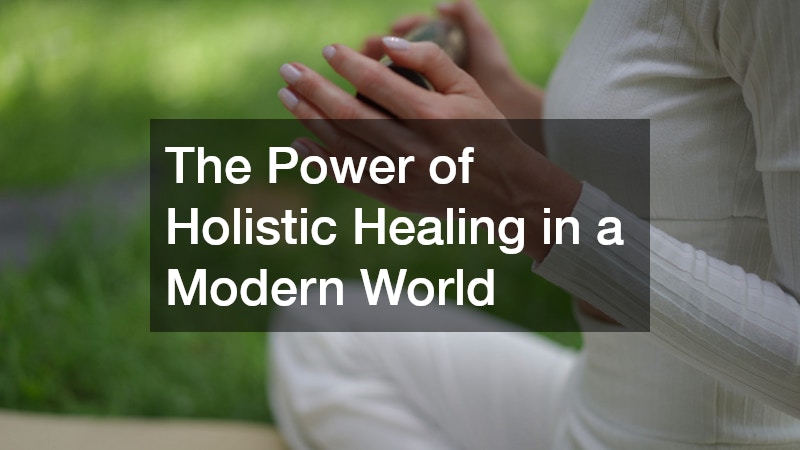
There is a growing desire for holistic approaches in healthcare as individuals seek more comprehensive solutions to their health needs. This increasing interest is influencing modern medicine, prompting a shift towards integrating holistic practices to enhance overall well-being. As a result, holistic healing is gaining recognition for its potential to improve quality of life by focusing on the interconnectedness of mind, body, and spirit.
Holistic healing is grounded in the belief that health is not merely the absence of disease, but a balanced state of physical, emotional, and spiritual well-being. Unlike traditional medicine, which often focuses on symptomatic relief, holistic healing aims to address the root causes of health issues.
Video Source
This philosophy emphasizes the importance of treating the whole person, encouraging practices that support all dimensions of health.
One key aspect of holistic healing is its focus on prevention and the promotion of healthy lifestyle choices. Practitioners believe that by maintaining balance and harmony within the body and mind, individuals can prevent many common ailments. This proactive approach contrasts with conventional medicine, which often intervenes after illness has developed.
The mind-body connection is a cornerstone of holistic healing, highlighting the impact of mental and emotional states on physical health. Studies have shown that stress, anxiety, and negative emotions can contribute to a variety of health issues, including heart disease and weakened immune function. Holistic practices often incorporate mindfulness and meditation techniques to strengthen this connection and promote healing.
By fostering awareness and self-regulation, individuals can reduce stress and improve their ability to manage emotions, leading to better overall health. Practices like yoga and tai chi, which merge physical movement with mental focus, exemplify the mind-body connection in action. Through regular practice, individuals can achieve greater balance, flexibility, and resilience in both body and mind.
Holistic healing can yield significant physical health improvements by enhancing the body's natural defenses and promoting self-healing. Techniques such as acupuncture and massage therapy are known to alleviate pain, reduce inflammation, and improve circulation. Studies have demonstrated that individuals who engage in holistic practices often experience enhanced immune function, lowering their risk of illness.
Furthermore, holistic approaches may support chronic disease management by addressing the underlying causes rather than solely focusing on symptom relief. This comprehensive perspective can lead to more sustainable health outcomes, as patients adopt healthier habits and reduce reliance on medication. As a result, individuals can enjoy improved quality of life and a greater sense of vitality.
Holistic healing places significant emphasis on mental and emotional wellness, recognizing their critical role in overall health. Techniques such as meditation, mindfulness, and breathwork are often employed to reduce stress and promote relaxation. As individuals learn to manage their emotional states, they often experience greater resilience and a more positive outlook on life.
By addressing emotional health, holistic practices can alleviate symptoms of anxiety, depression, and other mood disorders. This emotional balance can translate into improved interpersonal relationships, increased productivity, and enhanced creativity. Ultimately, the goal is to cultivate a sense of peace and contentment that nourishes both mind and body.
Adopting holistic practices can instigate meaningful lifestyle changes that foster long-term well-being. By prioritizing balance and harmony, individuals are more likely to make conscious choices that support overall health. These changes often include adopting healthier eating habits, engaging in regular physical activity, and cultivating supportive social connections.
Holistic healing encourages individuals to view health as a lifelong journey rather than a destination. By focusing on prevention and self-care, individuals can develop habits that promote sustained vitality and resilience. This perspective shifts the focus away from short-term solutions and towards practices that enhance overall quality of life.
Integrating simple holistic practices into daily life can be an accessible way to experience the benefits of holistic healing. Practices such as meditation and mindfulness can easily be incorporated into daily routines to promote relaxation and reduce stress. Research has shown that even a few minutes of daily meditation can enhance mental clarity and emotional well-being.
Additionally, incorporating mindful breathing exercises can help center the mind and foster a sense of calm. These practices can be performed virtually anywhere, making them convenient for those with busy schedules. Over time, individuals often find that these simple interventions lead to improved focus, increased self-awareness, and enhanced emotional resilience.
To maximize the benefits of holistic healing, individuals can create personalized routines that align with their unique health goals and lifestyles. This process often begins with a thorough assessment of current habits, needs, and areas for improvement. By setting clear intentions, individuals can identify the holistic practices that resonate most with their desired outcomes.
Incorporating a variety of practices, such as yoga, journaling, and herbal remedies, ensures a well-rounded approach to healing and wellness. Balancing these activities with work, family, and social commitments requires careful planning and flexibility. As individuals experiment with different techniques, they can adjust their routines to suit their evolving needs and preferences.
Embracing holistic healing offers the opportunity to cultivate a balanced and fulfilling life, integrating the best of both traditional and modern approaches to health. By focusing on the interconnectedness of mind, body, and spirit, individuals can achieve optimal well-being and resilience. As the demand for holistic practices continues to rise, they promise to play an increasingly vital role in transforming healthcare and enhancing quality of life in our modern world.
.